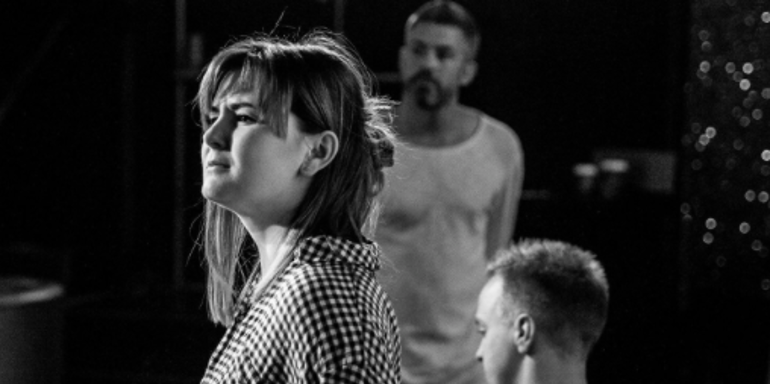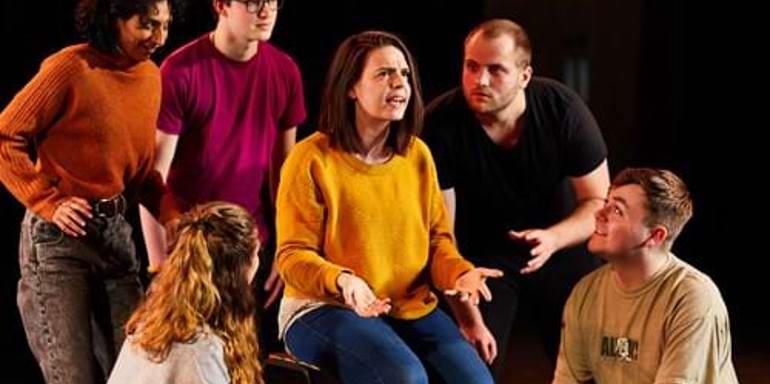2020 saw many of our industries evolve and adapt to challenges, and find new ways of working. But whilst the live art scene is temporarily on pause, it certainly isn't going away for good. Here we speak to Performing Arts lecturer Vic Gimby on why the Performing Arts industry is more vital to our society now than ever, and how practitioners can adapt to meet the new needs of this ever-evolving industry...
Q - Last year was a challenging year for many people, and many industries. Why does theatre, and for that matter any other art form, continue to be so vital to our society?
A - During this pandemic, people have turned to the arts for escapism. Sources like Netflix, Broadway HD, BBC, Amazon, National Theatre Live, Tiktok, YouTube and every other content platform around, provide entertainment that has been welcomed, giving people solace in ways that only art can.
Historically, when the world suffers trauma, the aftermath sees a huge growth in the arts, especially around experiences that people can share together. It’s both ironic and frustrating at the moment that taking a break from one screen often means turning to another - so being in a room with other people, experiencing the same magic at the same moment will be in high demand, and in particular, theatre.

Vic Gimby
The world is built upon stories - they are woven into the very history and fabric of life. Theatre has a way of telling stories in a way that is immediate, visceral, personal and inclusive, and from every vantage point. The ‘one time only’ nature of theatre is what makes it so special. It is a live experience that cannot ever be replicated.
The arts and culture industry now contributes £10.8billion a year to the UK economy - more than the entire agriculture industry and it continues to grow by a few percent each year. Here in the UK, we are renowned around the world for being the birthplace and cultivator of great actors, playwrights and artists. The arts are going nowhere - their shape may change and shift over time, but their importance, economically, socially and culturally will only ever grow.
Q - What changes are you currently seeing within the industry?
A - Due to the pandemic, there have been many changes within the industry, both in how we produce content, and in what we produce. Although most theatres have been forced to temporarily close over this period, many have found inventive new ways to reach audiences. Whether streaming shows online, or producing theatre that adheres to social distancing protocol, creatives have found ways to keep on creating, despite the ever-changing rules.
Aside from Covid-19, we have all been changed by the Black Lives Matter movement, and feel the need for systemic change both in the wider world and in our industry. There is a real need to hear voices and champion stories that don’t get enough of a platform, and to build this into the fabric of what we do to help redress the imbalance within our industry.
Representation in theatre is vital. We tell stories that are meant to reflect the world, and we put them on stage for all to see. These stories, and those telling them, must reflect our world and the people in it. This imbalance extends into gender and disability as well as ethnicity, and the awareness of this is leading to change.
This, I believe, is the direction in which the industry is moving; real people telling real stories about, or inspired by, the world around them, in ways that perhaps haven’t yet been seen or realised. Our Performing Arts courses here at Leeds Conservatoire have this ethos at heart; developing artists who will shape the future of theatre.
My own personal experience of seeing change in the industry came in October this year, when I directed a British musical with new rehearsal room and performance protocol in place. Some elements are temporary, such as reduced seating, audiences wearing masks, and actors keeping two meters apart; but others may well be here to stay. Despite this, the feeling amongst cast, crew and audience was that of joy and resilience. The lull in live performance has made creatives more determined than ever to produce new top quality theatre and to emerge inevitably changed, but stronger, as the arts always does when faced with challenges.

Q - As the industry continues to evolve, what skills do performers and practitioners need in order to succeed?
It is more important now than ever before to have several strings to your bow. I call myself a creative who specialises in new ‘music theatre’, but my remit stretches much further. Within my own career, I have written and produced my own plays, directed and dramaturged new musicals and plays, devised marketing and social media campaigns, raised money for productions, composed lyrics, choreographed shows, recorded backing vocals, operated lights, organised auditions, written rehearsal schedules, and I have even gone on stage when an actor was sick. I have often ended up doing several of these things at the same time for the same production!
This is all alongside my work as a lecturer and tutor and workshop leader. It may seem widely spread, but having this experience and extensive skillset has given me a deep understanding of how best the elements of a production can work together to create a cohesive piece. It has made me a better collaborator and above all has given me a clear focus for the work I want to create, and the stories I want to tell.
Aside from the creative skills, performers and practitioners need to understand the wider industry – such as the difference between the commercial and subsidised theatre, how to make inclusivity and accessibility a founding principle of everything they create, and how to use technology to their advantage with marketing (as well as in the creation of the piece).
Of course you can be one thing - for example - an actor, a composer, a singer, but more often than not you will be employed in several capacities. I have known actors who have been swing, understudy and associate choreographer in the same production, and musical directors who have had to MD, compose, arrange and mix the cast recordings for a show. The cross over between roles, and collaborative nature of the industry, means that if you have the ability to wear many hats and adapt to the needs of the production, you are more employable. This will only grow as new forms of theatre are created; the writer-performer and the actor-musician are now staples in the theatre world, and who knows what may come next.
Find out more about our Performing Arts courses: BA Acting, BA Actor Musician, BA Musical Theatre, MA Dramaturgy, MA Musical Direction, MA Musical Theatre Company and MA Musical Theatre Creatives
Find out more about Vic Gimby.







